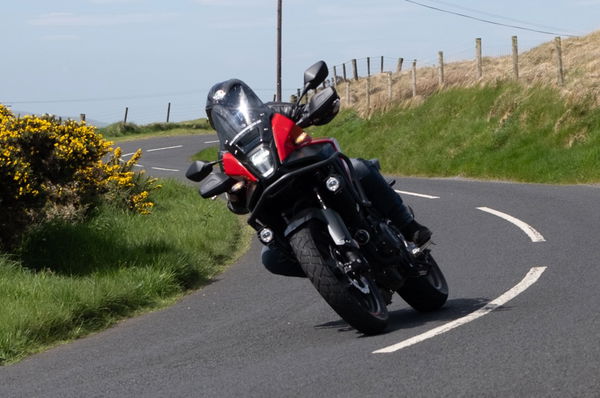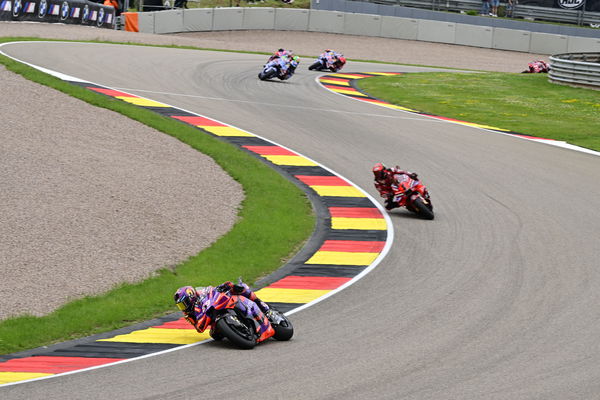Five memorable MotorLand moments from Marc Marquez
Marc Marquez has been involved in some incredible moments through his career, and many of the most memorable took place in MotorLand Aragon.
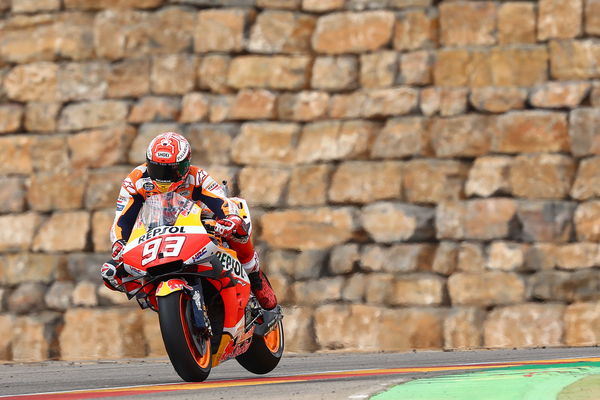
Marc Marquez will return to competitive action this weekend following confirmation earlier in the week that his medical team had given him the go-ahead to make his comeback.
The eight-times World Champion has been out of MotoGP since he had a fourth surgery on his right humerus - that was first broken at the 2020 Spanish Grand Prix - in the week after the Italian Grand Prix earlier this year in June.
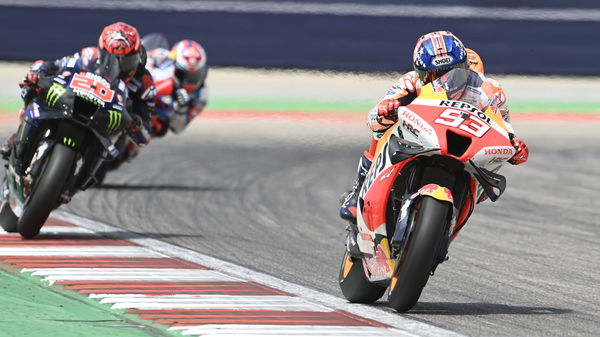
The track Marquez will return to is Aragon. The circuit features an anticlockwise layout - which Marquez loves - and it is close to the #93’s home town of Cervera. It has also played host to many great and spectacular moments from Marquez’ racing career - good and - and so we thought we would take a look at five of those ahead of his MotoGP comeback this weekend.
2010 - Taken Out in Turn One
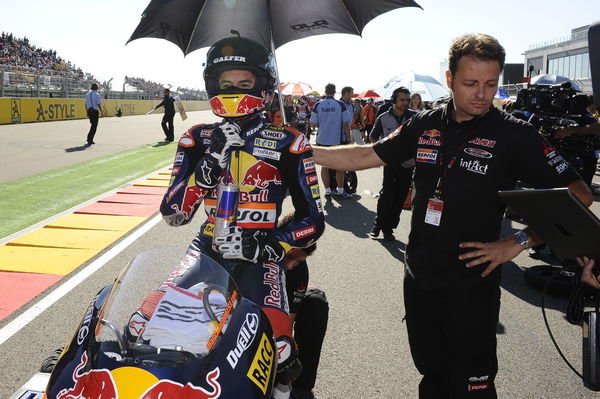
After Marc Marquez won the 2010 125cc San Marino Grand Prix in Misano, he held a nine-point lead over his compatriot Nico Terol.
Despite finishing on the podium in seven of the first eight races of the season, and winning five Grands Prix in a row between the Italian and German GPs, missing the podium in back-to-back races in the Czech Republic and Indianapolis - both of which were won by Terol - meant that in Misano there was a need to win, and Marquez delivered.
At the next race in MotorLand Aragon - the first time MotoGP had visited the venue - Marquez qualified on pole position by over half-a-second over second-placed Sandro Cortese, and he was 0.6 seconds ahead of Terol. He looked destined to turn his first visit to Aragon into a successful one, and strengthen his position at the top of the championship.
But, his hopes of a home win were lost due to a mistake from Randy Krummenacher in the first corner. The Swiss rider crashed, and his unguided motorcycle hit Marquez, who fell helplessly.
The #93 was unable to rejoin, and his championship lead was lost. He fell to third in the standings behind Terol and Pol Espargaro, but won the next four races in a row - including the famous victory in Estoril where he was forced to start from the back of the grid after crashing on the sighting lap - before finally confirming his status as a World Champion for the first time in Valencia, where he finished fourth, but Terol could only manage third.
But, the moment in Aragon was perhaps one of the first times we saw the desperation to win from Marquez. Going into the race, it seemed certain that he would take the 25 points, but circumstances outside of his control prevented him from fulfilling that.
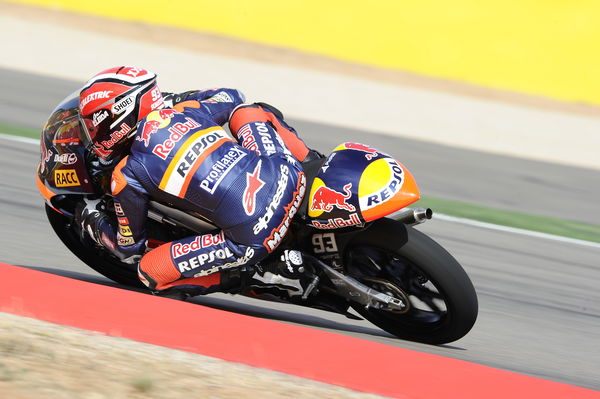
He was just 17-years-old at the time, and so his reaction in the run-off area as the track marshals wheeled his broken Derbi away could be viewed as something of a ‘childish temper tantrum’.
In hindsight, these outbursts of anger and frustration have become a part of Marquez’ racing persona through his career (usually when he makes a mistake himself), just as has his ability to control them when it matters. His 2016 and 2017 world titles were built on managing emotions, his desperation to win, and situations outside of his control.
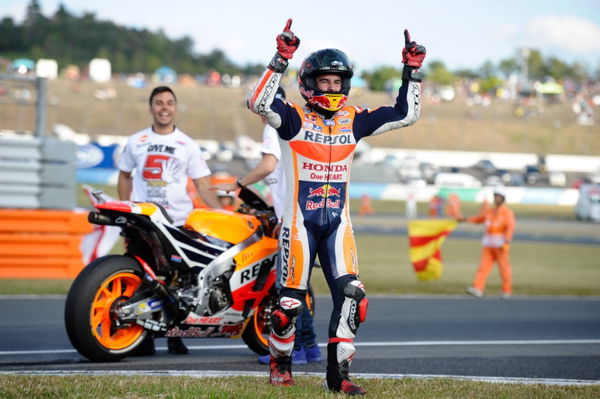
The Honda RC213V in those two years was not good enough to win the MotoGP World Championship in the hands of most riders (Dani Pedrosa won three races across 2016 and 2017), but Marquez dragged every point out of the bike almost every weekend, which built the foundation for his domination of the 2018 and 2019 seasons, when the bike improved (at least for Marquez’ style) and its engine got faster.
But it all started back in 2010, and the Aragon crash - and his reaction to it - was a major part of that.
2014 - Crashes on Slicks as the Rain Starts to Fall
2014 was a year of domination for Marquez. He won the first 10 races of the season back-to-back, and but for a supposed mechanical problem in Brno, he would have probably won the first 12.
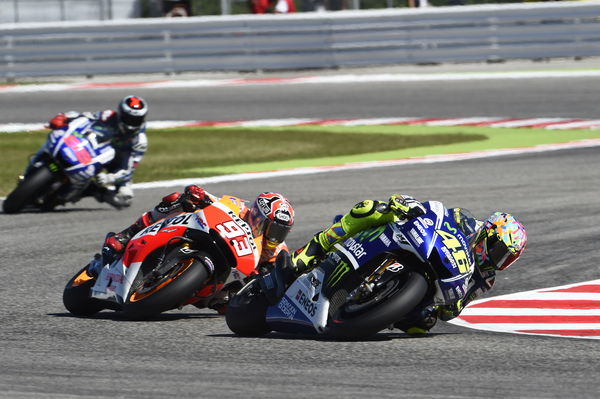
It was not until round 13 of the season in Misano that Marquez made his first mistake, when he crashed while chasing Valentino Rossi for the lead.
Marquez wanted to maximise his points haul in San Marino to give himself the best chance of winning his MotoGP world title at the next race in Aragon. But, of course it did not go to plan, and Rossi led home a Yamaha 1-2 ahead of Jorge Lorenzo.
The 2013 race in MotorLand was one of controversy and domination for Marquez (we will get to that race a little later), but it was the domination which mattered more a year on.
Marquez had beaten Jorge Lorenzo in 2013 by 1.3 seconds in the middle of their fight for the world title. In 2014, Lorenzo had not been as strong as he was the year before, but since the summer break he had found more pace, and finished second in the four races since the summer in Indianapolis, Brno, Silverstone and Misano.

The 2014 Grand Prix of Aragon took place in unusual conditions for what is essentially a desert location. There had been rain in the morning of the race day, and that meant the astroturf - which then was placed on the outside in almost all of the corners in Aragon - was wet.
That caught out Valentino Rossi on lap one of the MotoGP race when he ran wide to avoid Dani Pedrosa between turns six and seven. He touched the artificial grass, crashed, and knocked himself briefly out. His compatriot, Andrea Iannone, nearly crashed on the astroturf on the exit of turn 10 a little later on.
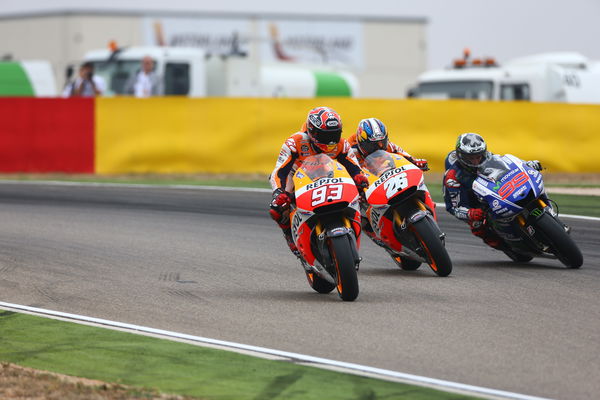
For Marquez, there was no such issue, but there was the issue of Jorge Lorenzo, who led between laps nine and 11. The pace was in the low 1:49s, but on lap 11 Lorenzo dropped to a 49.5, and with Pedrosa also close behind Marquez decided to hit the front. He got down to a 1:49.2 on lap 12, but on lap 13 was back to a 49.5, and on lap 14 a 50.5. The rain had arrived.
The decision of whether to stop to change bikes or continue on slicks would be an important one. This was the first race to start dry and get wet since the start of Marquez’ MotoGP career in 2013, and the only other time he had stopped during a race was in the 2013 Australian Grand Prix, when he was a lap too late and got disqualified as a result.
This time, Marquez stayed out, as did teammate Pedrosa, while Lorenzo pitted to swap to the wet bike.
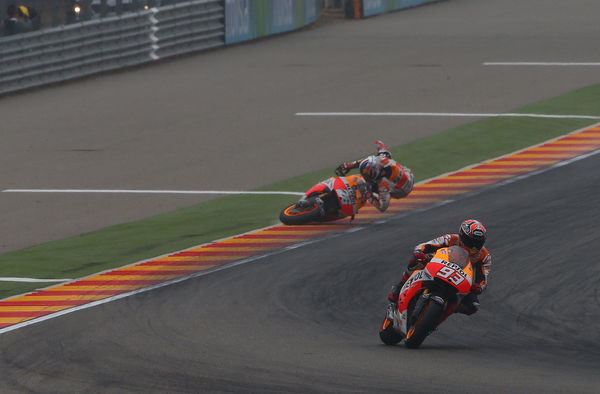
On lap 20, Pedrosa crashed on the brakes at turn one. He got back on, and back to the pits. A lap later, Marquez crashed at turn two. He also got back on, and got back to the pits. But the damage was done, and Lorenzo won his first race of the 2014 season by over 10 seconds ahead of Aleix Espargaro on the Forward Yamaha and Ducati’s Cal Crutchlow.
Although both Repsol Honda riders scored points, they threw away a chance to win through strategic error.
In Formula One, Alain Prost was known as ‘The Professor’ in the 1980s and 1990s, and was famed for his thoughtful approach to racing. A part of that was his decision to be on the right tyre at the right time in changeable conditions, even if it meant losing more time in the pits. It was better to be on the right tyre for the conditions, to have the correct amount of grip from the tyre to remain in control of the car, than to gain a few extra seconds by risking a mistake or a crash on the wrong tyre for the conditions in the hopes conditions would come back to you.
Prost won four Formula One World Drivers’ Championships in his career, and the four MotoGP World Riders’ Championships Marquez won between 2016 and 2019 can be attributed - at least in part - to his ability to think about changeable situations faster than anyone else, and to plan for them with his team.
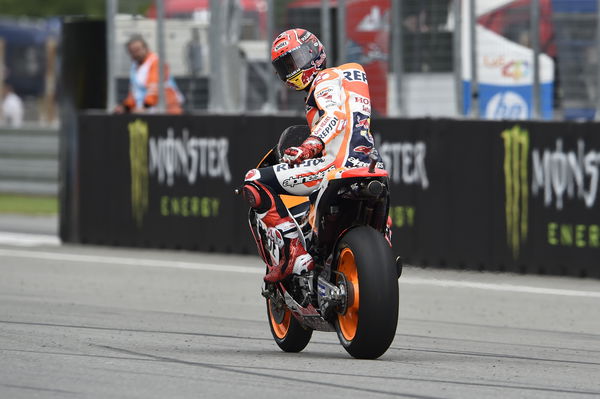
The ultimate example of this was at the 2017 Czech Grand Prix, when Marquez swapped bike one or two laps before every other rider, and ended up winning by 12 seconds after cruising in the final few laps.
Perhaps it is quite strange, then, that it was Andrea Dovizioso who became MotoGP’s ‘professor’.
2021 - Battle with Bagnaia
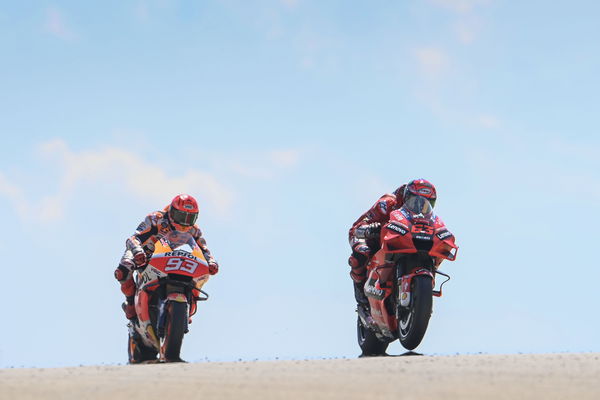
Marquez arrived in Aragon with a chance to win his second race of the year. His Sachsenring victory earlier in the 2021 season was his first since Valencia 2019, and since he broke the humerus in Spain 2020 that he is once again returning from this weekend.
Like in 2022, the RC213V of 2021 was a bike which even for Marc Marquez was incapable of winning a championship. He won three races in his comeback campaign, but one of those was at his best track (Circuit of the Americas) and another was gifted to him by Francesco Bagnaia in Misano.
Their Misano battle was not their first, though. They fought first on Marquez’ home turf in Aragon, and it was Bagnaia who came out on top.
Marquez trailed Bagnaia all race, until the final three laps when he began attacking his Ducati-mounted Italian rival.
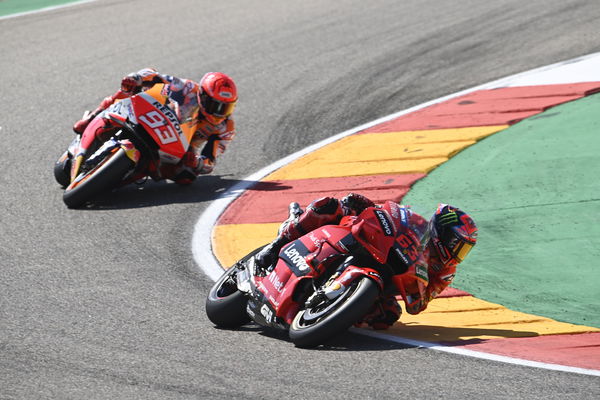
He had been in that situation before many times with the aforementioned Andrea Dovizioso, and, as with Dovizioso, Bagnaia was able to respond to every attack made by Marquez. In total, there were seven overtaking attempts made by the #93, and every one failed.
Bagnaia won his first MotoGP race, and went onto win four of the last six races of the season.
Perhaps, in hindsight, it is no surprise, since we now know that Marquez was racing then with one of his arms twisted by more than 30 degrees.
At the 2022 Grand Prix of Aragon, Marquez will be racing with a handicap once again. This time in the form of fitness and sharpness for a MotoGP bike and in a MotoGP race scenario. But, as he did last year, it would, in some ways, not be a surprise to see him fight for a podium.
2013 - Pedrosa’s TCS sensor
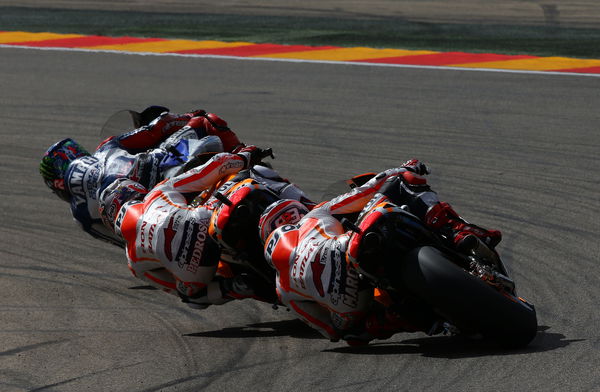
Traction control is a vital part of MotoGP. In 2013, that reality was even stronger. Whereas in 2022, MotoGP race with standard, unified electronics, in 2013 they were still developed in-house by each of the (then) three factories.
At the time, Honda’s was regarded as the most complex, but whichever system is discussed the sensors which communicated with the ECU to dictate and adapt traction control and anti-wheelie settings corner-by-corner, on-the-fly, were critical to their function.
In modern MotoGP, the bikes are fitted with two sensors one the rear wheel to detect wheel speed compared to the front wheel. In 2013, the RC213Vs were only fitted with one. In the case of a failure, the rider would be left with non-functional traction control.
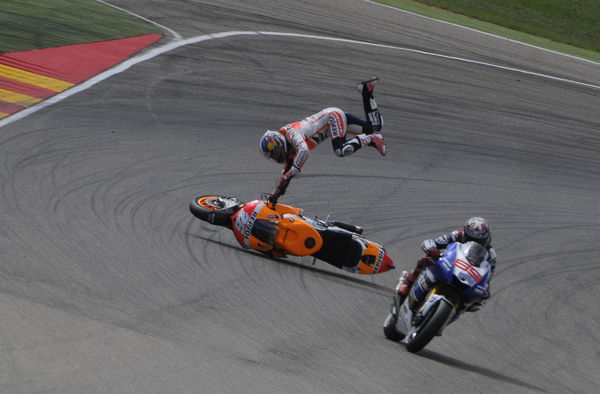
On lap six of the 2013 Aragon GP, Dani Pedrosa tipped into turn 12 as normal, but when he tapped in the throttle on the exit of the corner, the bike flicked him over the bars and out of the race.
His traction control had been disconnected, and it had been disconnected by Marc Marquez, who got into turn 12 too fast, and had to go wide, but lightly nudged Pedrosa’s rear wheel sensor as he did so.
Conspiracists would like to explain that Marquez did it deliberately, but such precision is hard to consider possible.
When Nico Rosberg hit Lewis Hamilton at the Les Combes chicane in Spa in 2014, conspiracists suggested that Rosberg had done it on purpose to damage Hamilton’s title challenge against him. But, that would have required Rosberg to make the contact in full knowledge that his front wing would not have broken off and gone under the car, losing his steering, or that he himself would not pick up a puncture that would lead to a car-breaking delamination.
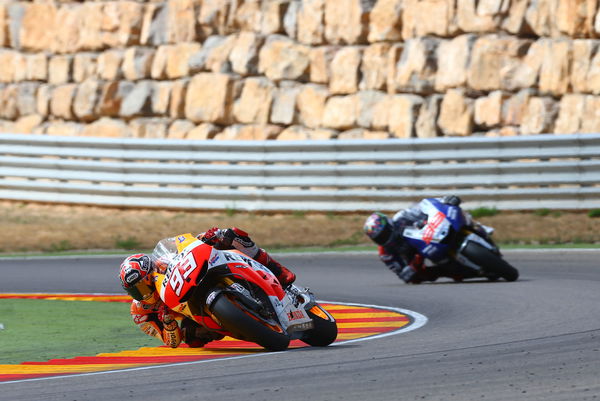
Rosberg did not know that, of course, and the contact was a mistake. The same was true of Marquez in Aragon 2013, but the consequences for Pedrosa were far different from those for Hamilton, and those for Rosberg different to those for Marquez.
Hamilton was eventually forced to retire from the 2014 F1 Belgian Grand Prix, but he did so with only his championship points suffering, and not his body. If you crash on a motorcycle, you are going to get hurt, and this one for Pedrosa was huge. Somehow, he won the next race in Sepang, but whereas Hamilton went onto win his second world title in 2014, Pedrosa’s MotoGP title charge was finished on the spot in Aragon.
Nico Rosberg was unable to recover from the time lost in the first lap contact with Hamilton, and Daniel Ricciardo went on to win the race for Red Bull. But, in Aragon 2013, Marquez continued as normal, won the race by 1.3 seconds ahead of Lorenzo, and won the championship. His only penalty was some points on his licence which were awarded on the Thursday before the next race in Sepang.
2019 - Two Seconds Faster
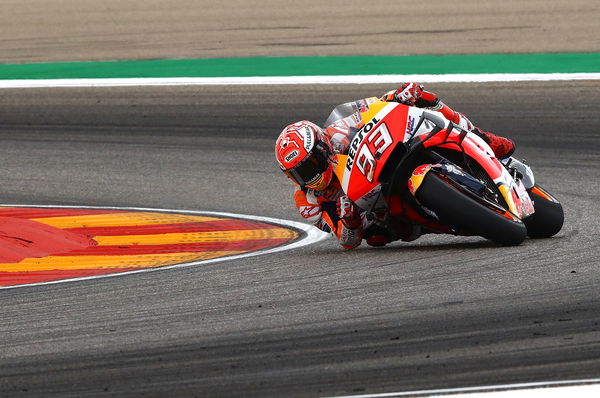
Marquez dominated the 2019 season. There was only one race where he did not finish inside the top two, and even that was not his fault. In Texas, an engine braking glitch on the Honda RC213V caused him to overload the front tyre going into turn 12 while managing a multiple-second second lead. It ended his unbeaten run in the US, but it was only blot on an otherwise magnificent 2019.
He won the world title with ease, and in Aragon laid down a marker that was simply embarrassing for the rest of the field.
In a full-dry Free Practice One on Friday morning, Marquez was at one point over two seconds faster than anyone else, and ended the session 1.617 seconds ahead of Yamaha’s Maverick Vinales, who was the only rider within two seconds of the #93. Fabio Quartararo was third in the session, 2.001 seconds slower than Marquez.

Andrea Dovizioso - who finished the race on Sunday in second place, 4.836 seconds behind Marquez (although the gap was almost seven seconds at its peak, Marquez slowed on the last lap) - was 2.020 seconds slower than Marquez in FP1.
Jorge Lorenzo, Marquez’ Repsol Honda teammate that year, was last in FP1, and finished the first session of the weekend 4.165 seconds slower than his teammate. In the race, Lorenzo finished second-last ahead of only the Tech 3 KTM of Hafizh Syahrin, and 46.087 seconds behind Marquez.
